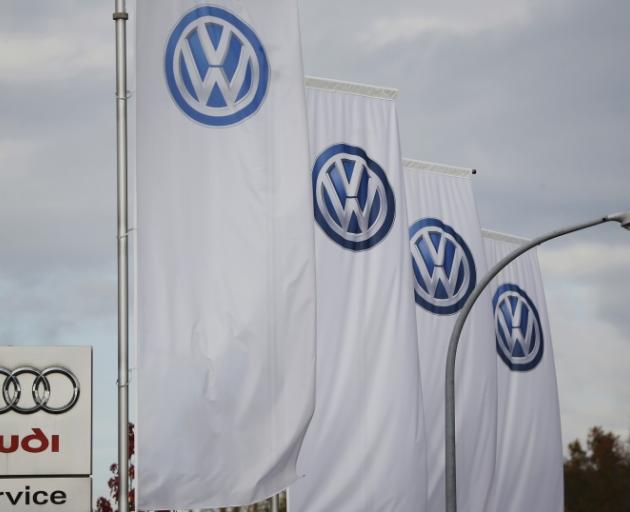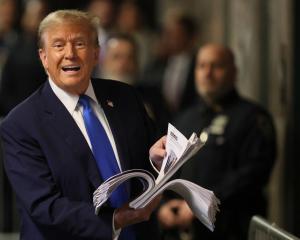
Germany is to retest all Volkswagen car models to gauge their genuine emissions levels after new revelations from the carmaker six weeks into its biggest-ever corporate scandal pushed the government to act.
Expressing his "irritation" with one of Germany's biggest employers, transport minister Alexander Dobrindt said on Wednesday that all current models sold under the VW, Audi, Skoda and Seat brands - with both diesel and petrol engines - would be tested for carbon dioxide and nitrogen dioxide emissions.
As the crisis deepened, VW said it had told dealers in the United States and Canada to stop selling recent models equipped with its 3.0 V6 TDI diesel engine, while the Moody's agency downgraded the firm's credit rating.
The German government's announcement followed a VW statement on Tuesday that it had understated the level of carbon dioxide emissions in around 800,000 cars sold mainly in Europe, and consequently their fuel usage. This means affected vehicles are more expensive to drive than their buyers had been led to believe.
The revelations added a new dimension to a crisis that had previously focused on how Europe's biggest carmaker cheated in US tests on diesel cars for emissions of nitrogen oxide, which cause smog.
Previously, the government had said it would review only nitrogen dioxide emissions from VW diesel cars.
"We all have an interest that everything at VW is turned over and reviewed," Dobrindt said, adding that the government wanted to force the company to pay the extra car taxes which would be incurred by the higher carbon dioxide emissions levels.
VW is Europe's biggest motor manufacturer, employing over 750,000 people in Germany, and has been a symbol of the nation's engineering prowess.
However, Dobrindt said the firm had caused "irritation in my ministry and with me", while Chancellor Angela Merkel's spokesman said it had to take steps to prevent such a case happening again, adding: "VW has a duty to clear this up transparently and comprehensively."
The admission about fuel consumption is the first that threatens to make a serious dent in VW's sales since the scandal erupted as it could deter cost-conscious consumers, analysts said.
Tuesday's revelations, which led to Volkswagen adding €2 billion ($NZ3.2 billion) to its expected costs from the scandal, are also the first time gasoline cars have been drawn into the crisis.
VW said most of the 800,000 cars affected had diesel engines such as VW's top-selling Golf, Audi's A3 hatchback and the Skoda Octavia but two models were gasoline: the VW Polo and the Audi A1, both with 1.4 litre engine and cylinder cut-off.
Moody's said it had downgraded Volkswagen's credit rating to A3/P-2 with a negative outlook due to this revelation.
"These new claims pose further challenges to Volkswagen's financial flexibility and competitive position, and heighten Moody's concerns about Volkswagen's internal control and governance issues, thus further weakening its rating profile," said Yasmina Serghini, Moody's lead analyst for VW.
Shares in Volkswagen closed down 9.5%, wiping more than another €3 billion off its market value. It has lost almost a third of its value or €24 billion since the scandal broke.
VW's "stop-sale" order in the United States and Canada followed a notice by the U.S. Environmental Protection Agency that VW group brands had installed illegal devices on some 3.0 V6 diesel models.
'BEYOND A JOKE'
Ernst-Robert Nouvertne, who runs two Volkswagen dealerships near Cologne with VW, Audi and Skoda models, said the situation was getting "beyond a joke".
"As bad as it is, the emissions issue alone would be manageable but this (CO2 admissions) is adding a new dimension to our troubles. I hope we will get through this at some point. People have already started to rail against VW. If they start railing about our product we have a problem."
The scandal erupted on September 18 when US authorities exposed VW's use of "defeat devices" to cheat tests for emissions of nitrogen oxide. VW admitted such software was installed in up to 11 million diesel vehicles worldwide.
VW's latest admission came after U.S. environmental regulators said the carmaker had failed to inform them that similar devices were installed on the larger 3.0 litre engines used in luxury sport utility vehicles from Porsche and Audi - something VW has denied.
Some analysts and investors criticised the September appointment of Matthias Mueller as VW group CEO, questioning whether the former head of its Porsche division and a company veteran was the right man to lead an overhaul of the business.
German lawyer Andreas Tilp, who filed legal action against VW last month on behalf of a private investor in the firm, said the CO2 admission gave the case "extra ammunition".
"With every widening of the scandal, the likelihood grows that a large number of people at VW had knowledge," he said.
Volkswagen's US boss has said the rigging of emissions tests was the result of actions by a small number of engineers.
"Another week, another shock in the VW story," Exane BNP Paribas analyst Stuart Pearson wrote in a note. "We add another 4 billion euros in recall costs and fear a harsher commercial impact," said Pearson, who rates VW "neutral".
The effects of the scandal have so far barely been reflected in VW sales figures - although it was the only German carmaker to report a decline in car registrations in Germany last month.












